News
Harry’s Game
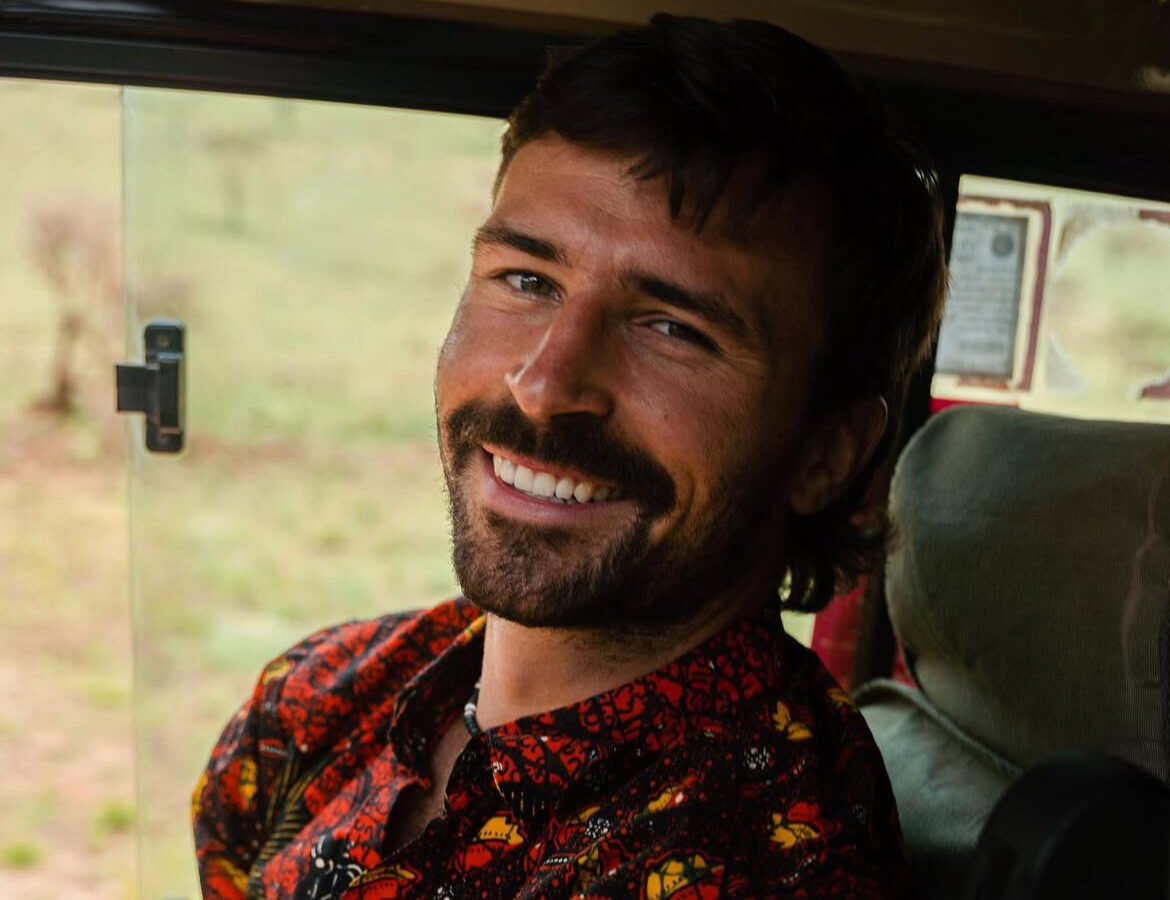
Sport is a strange thing. One moment, it wraps the athlete in its embrace, giving them a purpose, an identity, and a home. The next, it casts them adrift.
Take Harry McNulty, for instance. He was the kind of player who left his fingerprints all over a game. Relentless at the breakdown, vocal in the huddle, a leader through both his words and actions.
Indeed, if he hadn’t been so busy putting in a typically exhaustive performance, he might have allowed himself to believe – just for a second – that an Olympic medal was within reach as the clock ticked down in Ireland’s quarter-final against Fiji twelve months ago.
One moment, McNulty was ensconced in an all-encompassing battle watched by millions at home on RTÉ’s prime scheduling slot. The next he could only look on as Waisea Nacuqu shattered Ireland’s hopes. Despite being on the cusp of the podium, McNulty left Paris 2024 with little more than memories and a suitcase.
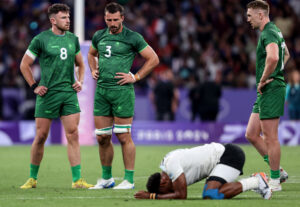
Mandatory Credit ©INPHO/Dan Sheridan
Thankfully, McNulty is well accustomed to packing his bags. For years, he was a vital cog in the machinations of Irish Sevens rugby. He was there when Ireland gritted it out at the basement floor of Europe’s Sevens circuit. He was also there as they ran out on the grandest global stage a decade later.
He considers himself extremely lucky. The great paradox of the Sevens games is that for all its perceived glamour, careers are typically short and the extensive travelling can be demanding. Yet he revelled in the environment, and was grateful for the opportunity it gave him to wear green with pride across the world.
“It’s mad how quickly things can change,” McNulty says. “One second you’re flying it, the next it’s all over. There’s no in-between. But that’s sport, I guess.”
Ironically, McNulty did have something of a middle ground to navigate. Having announced his retirement, he took on a role with World Rugby for the 2024/25 SVNS season. However, when it became apparent that Ireland would struggle to field a side in Cape Town, McNulty’s phone rang.
“I had decided that Paris was going to be the last hurrah,” McNulty says. “I didn’t announce it for a while because I wanted to be sure that it was the right call. I knew I could still play but to be honest, the reality of playing Sevens at 32 years of age began to dawn on me.
“The finances didn’t compare to the 15s game for a start, while playing at the intensity of Sevens was also going to push boundaries. I’d managed to get through my career without any significant injury (the lads used to joke that I couldn’t run fast enough to get one!), so rather than tempt fate I decided to pack it all in.
“For a few months after Paris I’d say you could count on one hand how many times I went to the gym. I found freedom in not having to be there, but I stayed fit mainly because I appreciate how staying strong contributes to my overall wellbeing.”
With several members of the Irish contingent hitched to their beds through illness, McNulty was summoned from a Cape Town bar to tog out just days following the announcement of his retirement. In true form, he barely put a foot out of line.
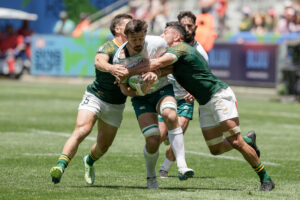
Mandatory Credit ©INPHO/Martin Seras Lima
“Thankfully the adrenaline kicked in and I managed to get through it,” McNulty says humbly. “In hindsight I suppose it was nice to get a bonus shot at it all. It was an honour to be called back in, but on a personal level, it also felt like a gentle farewell… a way to ease out of the picture and find peace with my decision.
“I’ve had a few opportunities come my way which mightn’t have happened if I kept playing. I played for the Irish Rugby Legends and I’ve been to tournaments in places like Fiji and India, where I recently played in the Rugby Premier League with guys like Rosko Specman and Jerry Tuwai. Real bucket-list stuff.”
Incidentally, while McNulty was in Australia to support his former teammate Hugo Keenan on the Lions tour recently, he was called in by the British & Irish Legends who were taking on the Classic Wallabies in their own series.
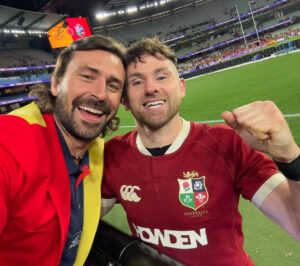
“I think the beauty of having played Sevens for so long is that I’ve built up a global network. I know that I could pick up the phone to someone almost anywhere in the world, and they’d have me collected at the airport. The SVNS series creates this amazing bond between its athletes.
“But at the same time, I was wise enough to know that I couldn’t keep living that dream for ever either.”
Having invested time into their off-field development, a number of McNulty’s fellow retirees have adjusted reasonably well to life after the game. Both Billy Dardis and Terry Kennedy work in the financial sector with TritonLake, Sean Cribbin works in construction consultancy while Jack Kelly has been a trainee solicitor at one of the country’s biggest legal firms.
Rather than be envious, McNulty celebrates their drive and points out that he was always destined for an alternative path. It just so happens that the route has taken him to the rolling plains of Africa.
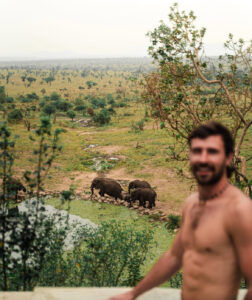
A keen traveller, McNulty is not one to sit still for very long, even when in recovery mode. Following the 2019 World Series leg in Hong Kong, he made his way home through Uganda. As he relaxed in the crater of an extinct volcano and observed silverback gorillas on his first safari experience, something stirred in him.
His love affair with the continent had begun and soon he was making plans to return. As the world around him began to shrink at the outset of the COVID-19 pandemic, McNulty was in Tanzania to witness the Great Migration before pressing on to Kenya’s Maasai Mara.
It was there that it all clicked and earlier this year he proudly launched his own business, 890 Expeditions, which sees the much travelled McNulty design and lead bespoke safari adventures.
“People always ask me what the 890 is about, and I’m always delighted to tell them that I’m the 890th person to represent Ireland at the Olympic Games. As a result, that number became a symbol for me, representative of the journey I have been on.
“And that’s the point of 890, just like no two people will share the same story and no two Irish Olympians will share the same number, no two safaris will be the same either. Whether you want to go deep sea fishing, or chase the Big Five – I will build the trip around your dreams.”
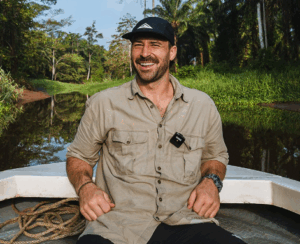
McNulty points out that East Africa has far more to offer than most people realise. Rwanda – whose powerful history continues to shape its present – is a country he believes more people should take the time to understand. Kenya was the first country to roll out the modern safari, while Uganda is known as the ‘Pearl of Africa.’ And then there’s the draw of African wildlife.
“We think we know it all from the David Attenborough documentaries,” he adds. “But when you’re out there tracking lions at dawn with no phone signal, it awakens a primal connection to the world which is all too absent these days.
“It’s a different kind of high,” he continues. “It’s not something you might realise was missing in your life until you experience it. I mean, I got a great buzz from rugby and all but this was something else completely.”

When McNulty spoke to us, he had just returned from his latest passion project. Huhuru House is a beachside hideaway on the Kenyan coast. It sleeps six, each room with its own ensuite, and sits just a short stroll from the Indian Ocean. A hidden paradise, McNulty now offers Huhuru as the perfect contrast following a few days in the bush. For both operator and his guests.
“People don’t realise how much work goes into a safari. It’s all about timing; when to go, where the animals will be, who the guide is. One small change and the whole trip feels different. That’s what I try to nail every time with the help of local knowledge.
“I only work with people I know and trust. I’ve come to know people in the area and they are keen to help because it also keeps money in the community and making sure tourism is a force for good.”
While McNulty also hopes to expand the horizons of 890 Expeditions in the coming months and years, Africa will remain its beating heart.
“I love going off the beaten track and this venture gives me great pleasure in showing this world to others. It’s not just about the animals, it’s about understanding what is happening all around you. Like my rugby, it makes me feel alive.”
From the roar of the Stade de France to the stillness of the savannah, Harry McNulty has found a different kind of purpose. However, it is one that is just as driven, and just as rewarding.
“I used to push myself to the limit physically. Now I help people push themselves in other ways. I love getting them out of their comfort zone. I make them switch off and reconnect. That’s where the real fulfilment lies.”
While rugby was never going to be the final destination, it was the road that led him off the beaten track.
Follow Harry’s travel adventures on Instagram here.
Back to News
Latest Posts

Highlights: January 2026

A Diplomatic Move

















